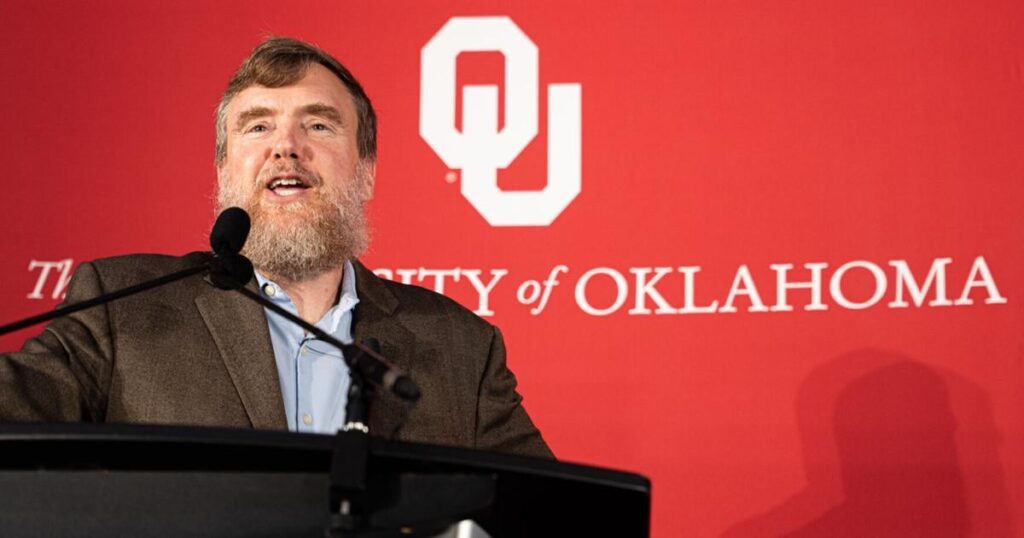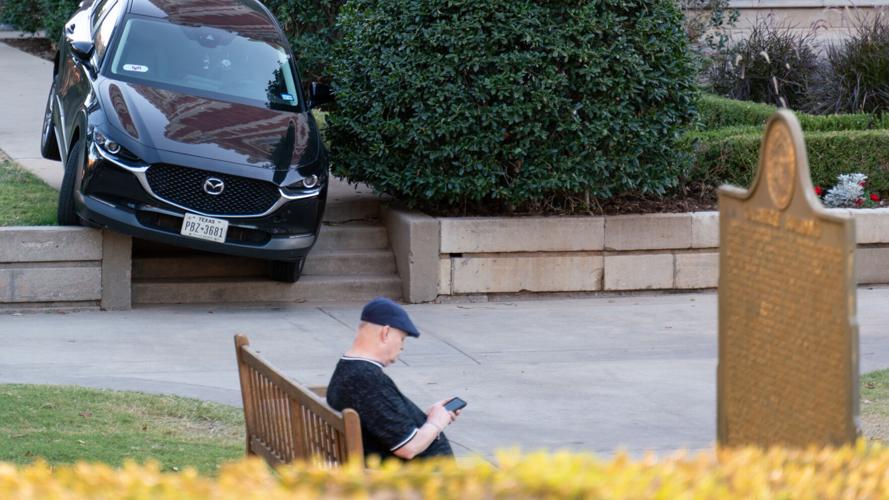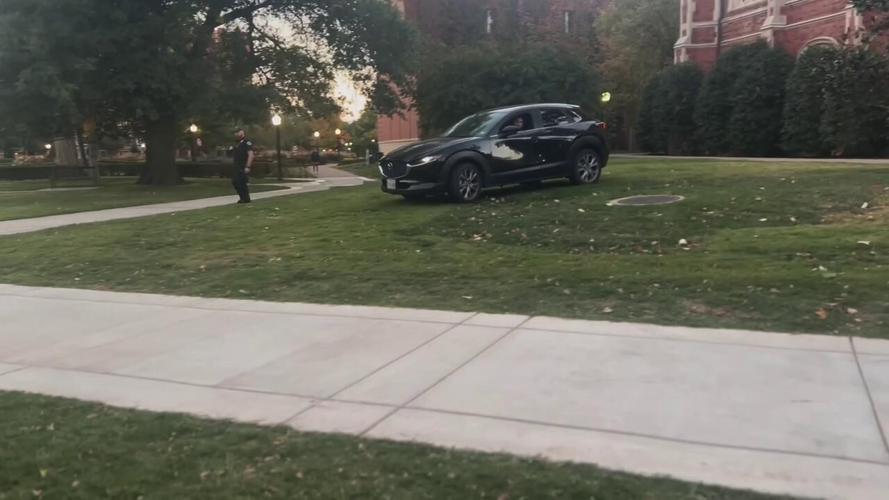Greg Lukianoff spoke about free speech and cancel culture during his keynote address for OU’s Free Speech Week Tuesday.
Lukianoff, author and president and CEO of the Foundation for Individual Rights and Expression, spoke about FIRE’s rankings of free speech trends. Lukianoff said the rankings evaluate how well American universities comply with the First Amendment.
“We give schools a green, yellow or red light ranking,” Lukianoff said. “Red light being laughably unconstitutional, green being no problem at all.”
The 2025 free speech ranking report, conducted by FIRE and College Pulse surveyed 58,807 college students across 257 universities.
According to the findings of the survey, OU ranked 51 of the 251 schools in the 2025 report.
Lukianoff said 78% of students in the survey said it’s at least rarely acceptable to shout down a speaker.
“So saying rarely acceptable might actually exactly refer to the number of times a controversial speaker is invited,” Lukianoff said. “Controversial speakers tend to be rarely invited in the first place.”
He said 36% of students at OU believe violence is rarely, sometimes or always acceptable to prevent speech and half the student body has practiced self-censorship at least once or twice a month.
In 2021, FIRE criticized OU in an article for an “Anti-Racist Rhetoric & Pedagogies” workshop held by an OU professor. While the workshop was voluntary, FIRE wrote that the workshop was teaching participants to limit free speech among students. FIRE then posted a recording of the workshop to its YouTube account.
Following the posting of the article and video in 2021, Julie Ward, OU American Association of University Professors vice president, criticized FIRE and said its actions left OU faculty members vulnerable to online hate.
Michael Givel, president of the OU’s chapter of AAUP, said FIRE’s view of freedom of speech leans toward an absolutist point of view of the First Amendment.
“Having FIRE talk about cancel culture — which as I understand it, is the topic of this keynote speech — is, to put it mildly, irony in the bounds,” Givel said. “The idea that you can engage in a free-for-all, pretty much in terms of speech or basically copy somebody’s speech and put it online, or whatever, is the epitome of cancel culture. Somebody should look in the mirror.”
During the speech, Lukianoff said 68% of students across the ranked colleges think shouting down a speaker is acceptable at some level.
“These numbers should be more like 0% or maybe like 3%,” Lukianoff said. “When you’re starting to get to a point where two-thirds of students think that shouting down is OK, that’s a massive failure for education, of what higher education is supposed to be about. Shout downs are mob censorship.”
Lukianoff said violence is the “antithesis of speech” and recalled one of the worst cases he knew, which included a former Israeli Defense Forces member evacuating from the University of California, Berkeley campus due to students shouting the speech down. In February, Lukianoff wrote an article about the incident, stating students engaging in violence must be expelled.
Lukianoff said last year was the worst year he had witnessed for free speech and he believes this year will be worse.
“Last year was the worst year for deplatforming we’ve ever seen in our history. … That includes dissipation attempts but also a huge number of shout battles, particularly after Oct. 7, but an awful lot before that as well,” Lukianoff said. “Things were not rosy for free speech on campus prior to Oct. 7, that’s for sure.”
Deplatforming means stopping someone from expressing themselves on social media.
Lukianoff discussed what he refers to as the “conformity gauntlet,” in which students who go on to become professors go through various pressures that lead to them self-censor later on in life when they have achieved a higher position in academia.
Lukianoff said professors also face pressure to conform from fear that they will be reported by students for offensive speech. Lukianoff referenced a study by researchers at North Dakota State University that found 70% of independent, 85% liberal and 56% conservative students would report a professor for offensive speech to a bias-related incident program.
Lukianoff also spoke about cancel culture. Cancel culture refers to ending public support for a person or organization following a scandal or public incident. According to FIRE’s website, cancel culture is when people organize against a person who has said something that is deemed offensive.
Lukianoff mentioned several cases of people who have been canceled, including the story of Carole Hooven, a former Harvard evolutionary biologist. Hooven faced backlash after saying there are only two sexes in an interview with Fox News, which led to her retirement from Harvard.
“To be clear, the threats to professor speech are historic,” Lukianoff said. “There is no parallel to this in history that we know of in terms of sheer numbers and for that matter, even percentage.”
Lukianoff referenced data from FIRE’s Scholars Under Fire Database, saying that over 1,000 professors became targets or were penalized for free speech. Lukianoff said, out of those scholars, approximately 200 were fired from their positions between 2014 to 2023.
Payden Morgan, an English junior, said her main takeaway from the speech was how canceling someone can impact more than the person’s career.
“The fact that that can impact their family, their personal lives. That’s something I as a student have never thought of,” Morgan said. “That was such an insightful thing to bring up.”
Joel Dixon, a regional city planning and public administration graduate student, said he was disappointed attendees couldn’t ask questions after the speech and said it was difficult to submit questions on a speech before he’d heard it.
Dixon had several questions he wished to ask Lukianoff and felt he left with more questions than answers after the speech.
“We talk a lot about cancel culture,” Dixon said. “How does cancel culture differ from the social consequences of having unpopular ideas and opinions?”
This story was edited by Anusha Fathepure, Ismael Lele and Ana Barboza. Mary Ann Livingood and Grace Rhodes copy edited this story.



